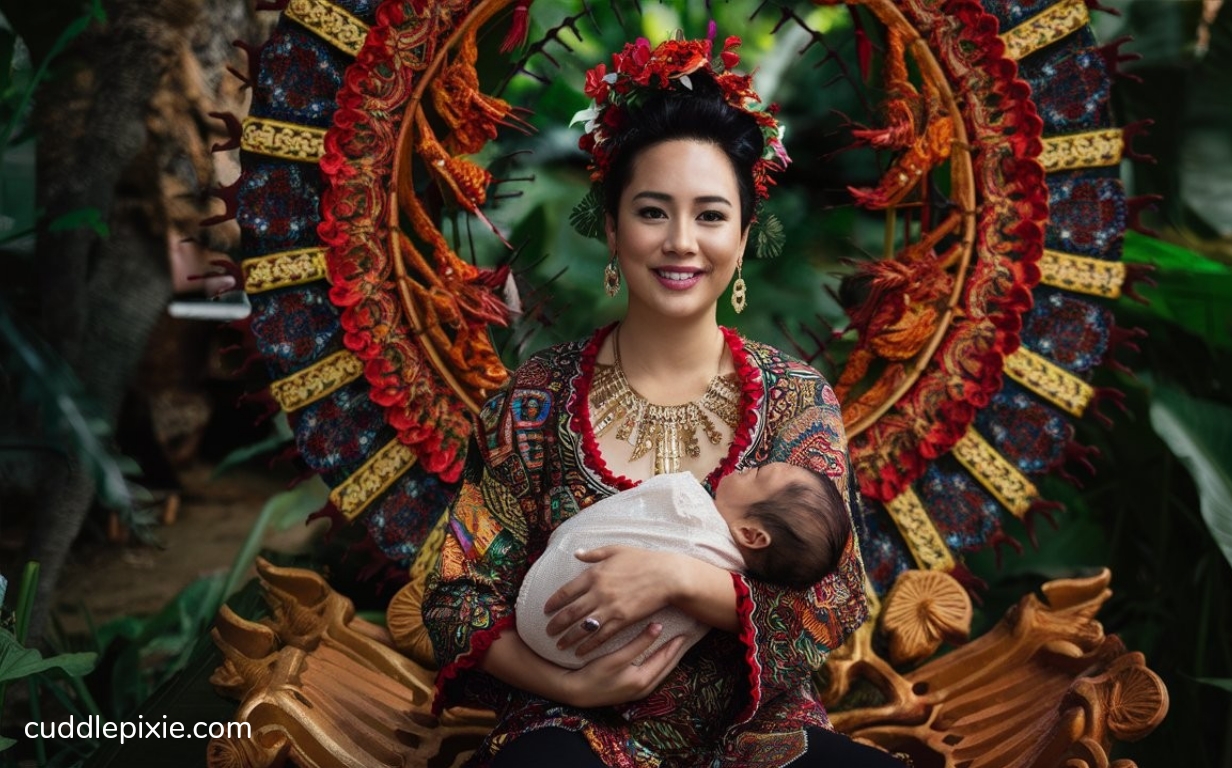Choosing a baby name is a momentous occasion, one that often involves deep thought and significant cultural consideration. In Indonesia, particularly in the Balinese and Javanese communities, names are not just labels but carry profound meanings and traditions that date back centuries. In this guide, we’ll explore the rich heritage of Balinese and Javanese baby names, offering insights into their cultural significance, popular choices, and tips for selecting the perfect name for your child.
In This Article
Understanding Balinese Naming Traditions
Balinese names are deeply rooted in the island’s Hindu heritage. Traditionally, these names convey the caste system and familial lineage. Names often reflect social hierarchy, with specific prefixes and suffixes indicating one’s position within the community.
Structure of Balinese Names
A typical Balinese name consists of three parts: a birth order name, a personal name, and often a caste name. The birth order names like “Wayan” (firstborn), “Made” (second-born), “Nyoman” (third-born), and “Ketut” (fourth-born) are ubiquitous. Personal names often have Sanskrit origins, reflecting religious and philosophical meanings.
Common Balinese Naming Patterns
Balinese names frequently include prefixes such as “I” for males and “Ni” for females, which signify gender. For example, “I Wayan” for a firstborn son and “Ni Wayan” for a firstborn daughter.
Popular Balinese Baby Names
Wayan
As the name for the firstborn son, “Wayan” signifies the beginning or the eldest. It’s a name that carries the expectation of leadership and responsibility.
Made
“Made,” the name for the second-born, symbolizes balance and support. It’s often given to children who are seen as the pillars of family harmony.
Nyoman
Given to the third-born, “Nyoman” represents the middle ground, bridging the gap between older and younger siblings.
Ketut
“Ketut,” reserved for the fourth-born, signifies completion and fulfillment. It’s a unique name that reflects the completion of the family cycle.
Top Balinese Names for Boys
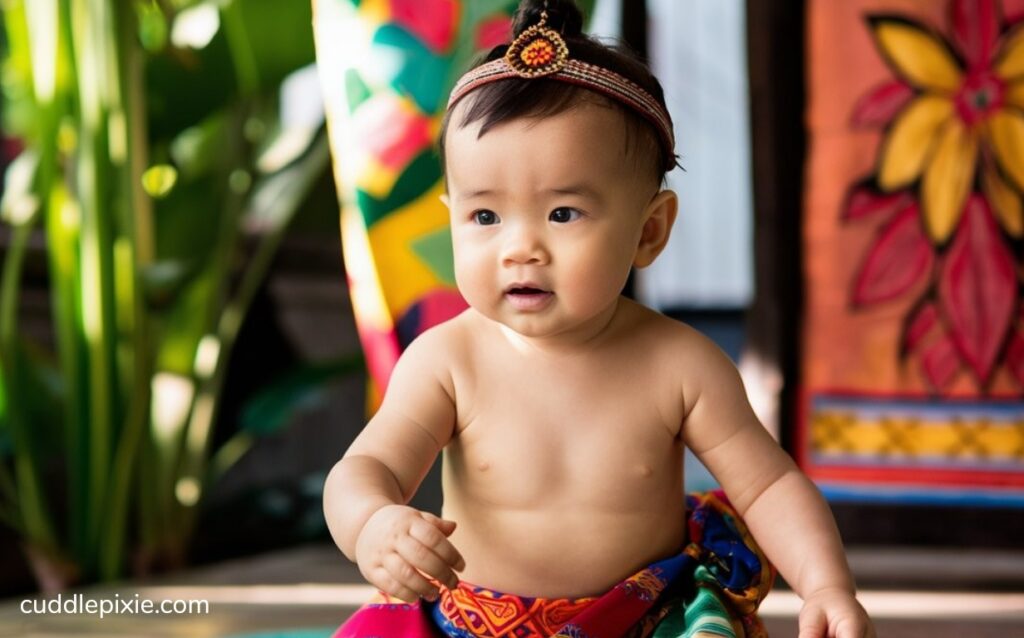
- Agung – Meaning “great” or “grand,” often given to those of higher caste.
- Arya – Meaning “noble” or “honorable,” used by the higher caste.
- Bagus – Meaning “handsome” or “good.”
- Bayu – Derived from “Bayu,” the god of wind.
- Bima – Meaning “mighty” or “strong,” inspired by the Mahabharata character.
- Dewa – Meaning “god,” often given to boys of the Brahmin caste.
- Gede – Meaning “big” or “elder,” often used for the firstborn.
- Gusti – Meaning “lord” or “master,” used in higher castes.
- Kadek – Meaning “younger sibling,” often used for the second-born.
- Made – Also meaning “second-born” or “middle child.”
- Nyoman – Meaning “third-born,” used for the third child.
- Putra – Meaning “son” or “prince.”
- Wayan – Meaning “first-born,” also used to denote the eldest child.
- Wira – Meaning “hero” or “warrior.”
- Yuda – Derived from “Yudh,” meaning “war” or “battle.”
- Arta – Meaning “treasure” or “wealth.”
- Bhanu – Meaning “sun” or “light.”
- Candra – Meaning “moon” or “shining.”
- Dharma – Meaning “duty” or “righteousness.”
- Eka – Meaning “one” or “first.”
- I Ketut – Used for the fourth-born child, often shortened to Ketut.
- Jaya – Meaning “victorious” or “conqueror.”
- Kala – Meaning “time” or “eternity.”
- Komang – Another name for the third-born child.
- Laksana – Meaning “mark” or “sign.”
- Manggala – Meaning “auspicious” or “leader.”
- Nengah – Meaning “middle” or “second-born.”
- Oka – Meaning “child” or “descendant.”
- Partha – Another name for Arjuna, meaning “son of Pritha.”
- Rama – Meaning “pleasing” or “charming,” inspired by the epic Ramayana.
- Sena – Meaning “army” or “force.”
- Surya – Meaning “sun” or “solar.”
- Tirta – Meaning “holy water.”
- Upadana – Meaning “principle” or “foundation.”
- Vidya – Meaning “knowledge” or “wisdom.”
- Wibawa – Meaning “authority” or “dignity.”
- Yoga – Meaning “union” or “discipline.”
- Bali – Meaning “strong” or “powerful.”
- Gana – Meaning “troop” or “multitude.”
- Indra – Meaning “possessing drops of rain,” the king of gods.
- Karna – Meaning “ear” or “hearing,” inspired by the Mahabharata character.
- Lila – Meaning “play” or “divine sport.”
- Maha – Meaning “great” or “mighty.”
- Nara – Meaning “man” or “human.”
- Putu – Another name for the first-born child.
- Raditya – Meaning “sun” or “day.”
- Satria – Meaning “knight” or “warrior.”
- Tama – Meaning “darkness” or “night.”
- Udaya – Meaning “rising” or “ascendant.”
- Wana – Meaning “forest” or “wood.”
These names reflect the rich cultural and religious heritage of Bali, often connected to Hinduism and the island’s traditions.
Top Balinese Names for Girls
Ni Wayan
For girls, “Ni Wayan” carries the same significance of being the eldest, expected to set an example and guide younger siblings.
Ni Made
“Ni Made” for girls embodies the supportive and balancing role within the family.
Ni Nyoman
“Ni Nyoman” for the third-born daughter holds the meaning of unity and connection.
Ni Ketut
“Ni Ketut” symbolizes the completeness and joy brought by the youngest daughter.
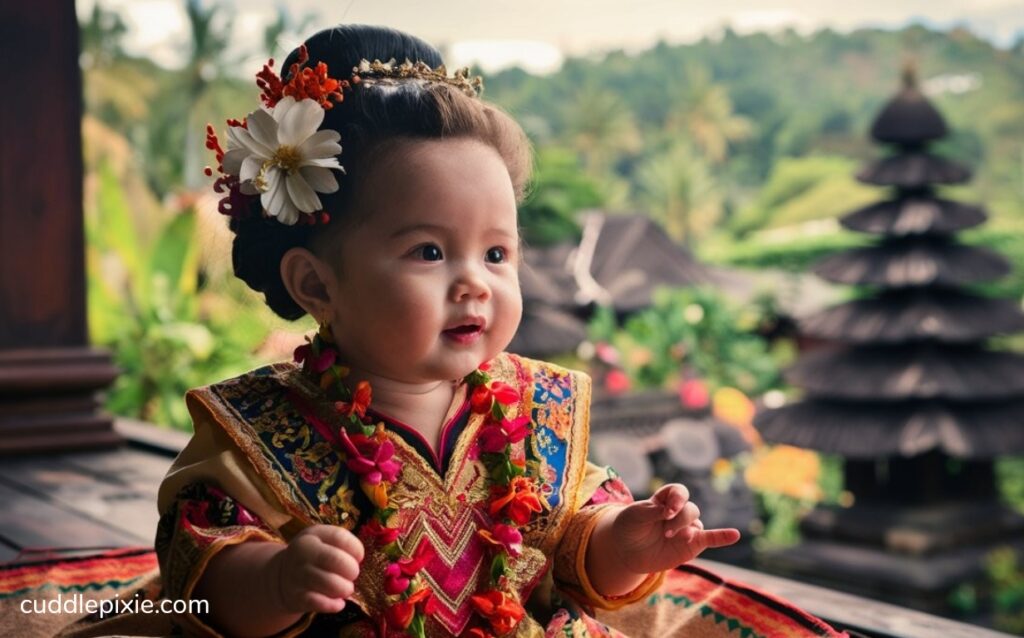
- Arti – Meaning “meaning” or “significance.”
- Asih – Meaning “love” or “affection.”
- Ayu – Meaning “beautiful” or “graceful.”
- Bunga – Meaning “flower.”
- Cahya – Meaning “light” or “radiance.”
- Cempaka – Meaning “magnolia” (a type of flower).
- Citra – Meaning “image” or “art.”
- Dewi – Meaning “goddess.”
- Desi – Derived from “desa,” meaning “village.”
- Dharma – Meaning “duty” or “righteousness.”
- Diah – Meaning “beautiful” or “elegant.”
- Eka – Meaning “one” or “first.”
- Galuh – Meaning “gem” or “jewel.”
- Indah – Meaning “beautiful” or “lovely.”
- Jaya – Meaning “victorious” or “triumphant.”
- Kadek – Meaning “younger sibling,” often used for the second-born.
- Kartika – Meaning “star” or “light.”
- Kirana – Meaning “ray of light.”
- Komang – Another name for the third-born child.
- Laksmi – Meaning “prosperity” or “fortune,” inspired by the goddess Lakshmi.
- Lestari – Meaning “eternal” or “everlasting.”
- Luh – Meaning “young girl” or “maiden.”
- Made – Also meaning “second-born” or “middle child.”
- Manis – Meaning “sweet” or “lovely.”
- Maya – Meaning “illusion” or “magic.”
- Nadi – Meaning “river” or “flow.”
- Ningsih – Meaning “compassionate” or “loving.”
- Nirmala – Meaning “pure” or “clean.”
- Nyoman – Meaning “third-born,” used for the third child.
- Padmi – Meaning “lotus.”
- Putu – Another name for the first-born child.
- Ratih – Meaning “goddess of love.”
- Ratna – Meaning “gem” or “precious stone.”
- Rahayu – Meaning “peaceful” or “safe.”
- Rini – Meaning “small” or “tiny.”
- Sari – Meaning “essence” or “core.”
- Santi – Meaning “peace.”
- Sekar – Meaning “flower.”
- Sinta – Derived from “Sita,” meaning “furrow,” inspired by the Ramayana character.
- Sri – Meaning “prosperity” or “wealth.”
- Tari – Meaning “dance.”
- Trisna – Meaning “longing” or “desire.”
- Utami – Meaning “first” or “primary.”
- Utari – Meaning “first” or “best.”
- Wayan – Meaning “first-born,” also used to denote the eldest child.
- Widya – Meaning “knowledge” or “science.”
- Wulandari – Meaning “moonlight.”
- Yuni – Meaning “youthful” or “young.”
- Yuniarti – Meaning “youthful beauty.”
Understanding Javanese Naming Traditions
Javanese names are influenced by a blend of Hindu-Buddhist, Islamic, and indigenous Javanese cultures. They often reflect a deep philosophical meaning, derived from ancient texts and cultural traditions.
Structure of Javanese Names
Javanese names typically consist of a single or compound word with significant meanings. Unlike Balinese names, there is less emphasis on birth order but more on virtues and aspirational qualities.
Common Javanese Naming Patterns
Javanese names often include poetic and spiritual elements, with names like “Raden” and “Roro” used to denote nobility and “Adi” for younger children.
Popular Javanese Baby Names
Arjuna
Derived from the Mahabharata, “Arjuna” represents a heroic and virtuous character, embodying bravery and righteousness.
Budi
“Budi” means wisdom or intellect. It reflects the parents’ hopes for their child to grow up wise and knowledgeable.
Joko
“Joko” simply means boy. It’s a popular name that signifies the traditional and humble beginnings of a child.
Top Javanese Names for Boys
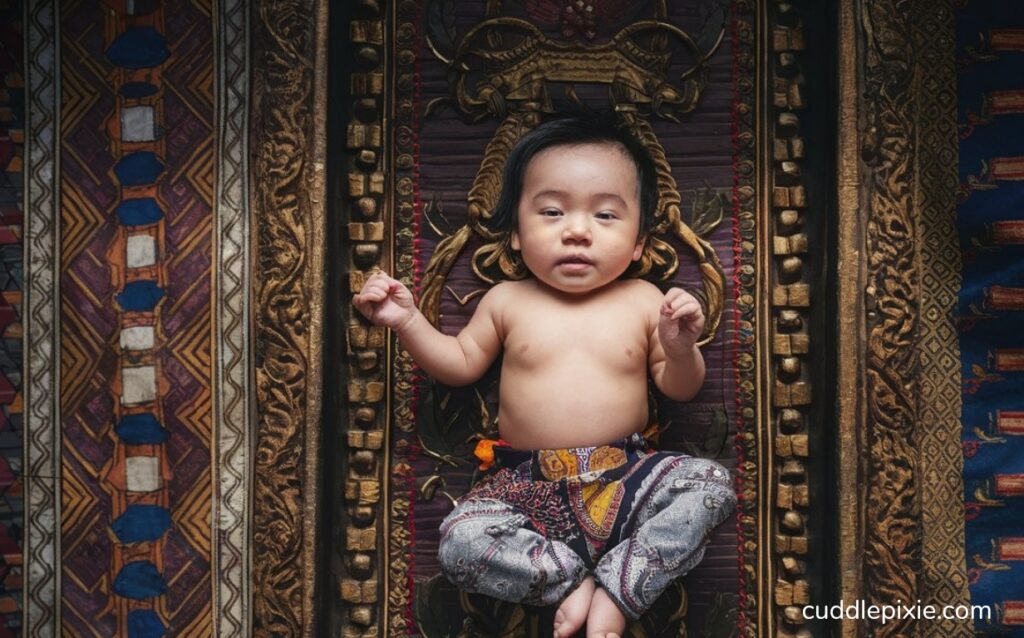
- Adi – Meaning “first” or “superior.”
- Agus – Meaning “good” or “exalted.”
- Arief – Meaning “wise” or “knowledgeable.”
- Bagus – Meaning “handsome” or “good.”
- Bambang – A traditional Javanese name often associated with heroism.
- Bayu – Meaning “wind” or “breeze.”
- Bimo – Derived from “Bima,” meaning “mighty” or “strong.”
- Cahya – Meaning “light” or “radiance.”
- Danu – Meaning “holy river” or “sacred water.”
- Darma – Meaning “duty” or “righteousness.”
- Eko – Meaning “first” or “number one.”
- Fajar – Meaning “dawn” or “sunrise.”
- Galih – Meaning “heart” or “inner core.”
- Handoko – Meaning “strong” or “resilient.”
- Haryo – Meaning “great” or “glorious.”
- Irawan – Meaning “from Irawan,” a character from Javanese wayang.
- Jatmiko – Meaning “honest” or “virtuous.”
- Kusuma – Meaning “flower” or “blossom.”
- Luhur – Meaning “noble” or “high-ranking.”
- Mahendra – Meaning “lord of the sky” or “king of the gods.”
- Nugroho – Meaning “blessing” or “gift from God.”
- Parikesit – A character from the Javanese wayang, meaning “prosperous.”
- Prabowo – Meaning “leader” or “commander.”
- Raharjo – Meaning “prosperous” or “successful.”
- Rama – Meaning “pleasing” or “charming,” inspired by the epic Ramayana.
- Rizky – Meaning “blessed” or “prosperous.”
- Santoso – Meaning “peaceful” or “serene.”
- Setiawan – Meaning “loyal” or “faithful.”
- Suharto – Meaning “having good fortune.”
- Sukarno – Meaning “good deeds.”
- Sukma – Meaning “soul” or “spirit.”
- Surya – Meaning “sun” or “solar.”
- Teguh – Meaning “steadfast” or “firm.”
- Tri – Meaning “three,” often given to the third child.
- Utomo – Meaning “best” or “superior.”
- Wahyu – Meaning “revelation” or “divine inspiration.”
- Widodo – Meaning “healthy” or “prosperous.”
- Wira – Meaning “hero” or “warrior.”
- Yuda – Derived from “Yudh,” meaning “war” or “battle.”
- Aditya – Meaning “sun” or “light.”
- Andika – Meaning “brave” or “valiant.”
- Bagaskara – Meaning “sun” or “light.”
- Daniswara – Meaning “prosperous” or “wealthy.”
- Eko Putro – Meaning “first son.”
- Galih Kencana – Meaning “golden heart.”
- Hadiwijaya – Meaning “victorious presence.”
- Jayadi – Meaning “glorious victory.”
- Kusumawardhana – Meaning “flower of the world.”
- Nugrahadi – Meaning “divine gift.”
- Ranggawarsita – A famous Javanese poet, meaning “one who speaks in a heroic manner.”
These names reflect the rich cultural heritage, traditional values, and deep spirituality of the Javanese people.
Top Javanese Names for Girls
Dewi
“Dewi” means goddess, symbolizing beauty and divinity. It’s a name that carries an aura of elegance and grace.
Sri
“Sri” is associated with prosperity and fertility. It’s a name often given in hopes of a bountiful and successful life.
Sari
“Sari” means essence or core. It’s a poetic name reflecting the inner beauty and purity of a person.
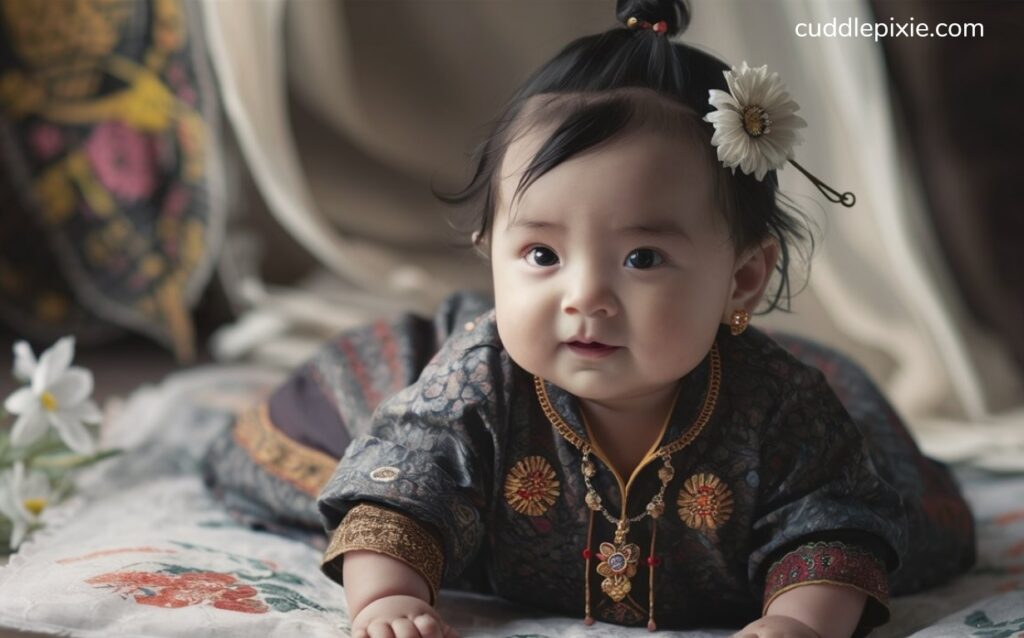
- Ayu – Meaning “beautiful” or “graceful.”
- Cahaya – Meaning “light” or “radiance.”
- Dewi – Meaning “goddess.”
- Indah – Meaning “beautiful” or “lovely.”
- Lestari – Meaning “eternal” or “everlasting.”
- Sri – Meaning “prosperity” or “wealth.”
- Kartika – Meaning “star” or “light.”
- Ratna – Meaning “gem” or “precious stone.”
- Sari – Meaning “essence” or “core.”
- Wulan – Meaning “moon.”
- Yuni – Meaning “youthful” or “young.”
- Arum – Meaning “fragrant.”
- Asih – Meaning “love” or “affection.”
- Cempaka – Meaning “magnolia” (a type of flower).
- Diah – Meaning “beautiful” or “elegant.”
- Endah – Meaning “beautiful” or “graceful.”
- Galuh – Meaning “gem” or “jewel.”
- Handayani – Meaning “having benefits” or “giving happiness.”
- Kusuma – Meaning “flower” or “blossom.”
- Mawar – Meaning “rose.”
- Melati – Meaning “jasmine.”
- Ningrum – Meaning “pure” or “holy.”
- Putri – Meaning “princess” or “daughter.”
- Rahayu – Meaning “peaceful” or “safe.”
- Sekar – Meaning “flower.”
- Sinta – Derived from “Sita,” meaning “furrow,” inspired by the Ramayana character.
- Tari – Meaning “dance.”
- Utami – Meaning “first” or “primary.”
- Widhi – Meaning “knowledge” or “science.”
- Anggraini – Meaning “like a flower.”
- Anisa – Meaning “friendly” or “companion.”
- Citra – Meaning “image” or “art.”
- Dwi – Meaning “two,” often given to the second child.
- Eka – Meaning “one” or “first.”
- Fitri – Meaning “pure” or “innocent.”
- Gita – Meaning “song.”
- Intan – Meaning “diamond.”
- Kartini – Meaning “pure” or “chaste,” inspired by Raden Ajeng Kartini, an Indonesian heroine.
- Lestari – Meaning “eternal” or “lasting.”
- Mega – Meaning “cloud.”
- Ningsih – Meaning “compassionate” or “loving.”
- Puspita – Meaning “flower.”
- Rina – Meaning “dawn” or “early morning.”
- Santi – Meaning “peace.”
- Tasya – Meaning “resurrection.”
- Wiwik – A traditional Javanese name often associated with beauty.
- Yuli – Meaning “youthful” or “young.”
- Ayu Lestari – Meaning “eternally beautiful.”
- Ratna Sari – Meaning “gem essence.”
- Sri Utami – Meaning “first in prosperity.”
These names reflect the beauty, spirituality, and cultural heritage of the Javanese people.
Combining Balinese and Javanese Baby Names
Combining Balinese and Javanese names can result in unique and meaningful names that honor both traditions. For example, “Wayan Arjuna” or “Ni Dewi Made” blend elements from both cultures, creating a rich tapestry of heritage.
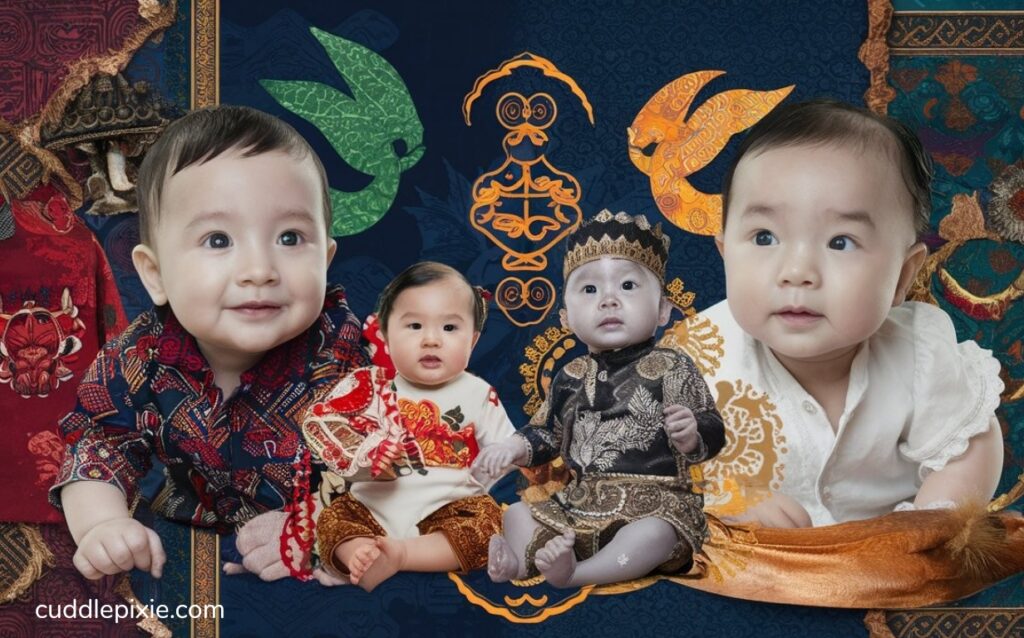
- Ayu Ratna – Meaning “beautiful gem”; combines Balinese “Ayu” (beautiful) and Javanese “Ratna” (gem).
- Bima Dewi – Meaning “mighty goddess”; combines Balinese “Bima” (strong) and Javanese “Dewi” (goddess).
- Cahya Sari – Meaning “radiant essence”; combines Balinese “Cahya” (light) and Javanese “Sari” (essence).
- Dewi Ayu – Meaning “beautiful goddess”; combines Javanese “Dewi” (goddess) and Balinese “Ayu” (beautiful).
- Galih Lestari – Meaning “eternal heart”; combines Javanese “Galih” (heart) and Balinese “Lestari” (eternal).
- Indah Sri – Meaning “beautiful prosperity”; combines Balinese “Indah” (beautiful) and Javanese “Sri” (prosperity).
- Jaya Wulan – Meaning “victorious moon”; combines Javanese “Jaya” (victorious) and Balinese “Wulan” (moon).
- Kartika Sari – Meaning “star essence”; combines Javanese “Kartika” (star) and Balinese “Sari” (essence).
- Luhur Ratna – Meaning “noble gem”; combines Balinese “Luhur” (noble) and Javanese “Ratna” (gem).
- Mahendra Sari – Meaning “great essence”; combines Javanese “Mahendra” (great) and Balinese “Sari” (essence).
- Ningsih Ayu – Meaning “compassionate beauty”; combines Javanese “Ningsih” (compassionate) and Balinese “Ayu” (beautiful).
- Putu Dewi – Meaning “first daughter”; combines Balinese “Putu” (first-born) and Javanese “Dewi” (goddess).
- Rahayu Sari – Meaning “peaceful essence”; combines Javanese “Rahayu” (peaceful) and Balinese “Sari” (essence).
- Santi Ratna – Meaning “peaceful gem”; combines Balinese “Santi” (peace) and Javanese “Ratna” (gem).
- Sekar Dewi – Meaning “flower goddess”; combines Javanese “Sekar” (flower) and Balinese “Dewi” (goddess).
- Tari Ayu – Meaning “graceful dance”; combines Javanese “Tari” (dance) and Balinese “Ayu” (beautiful).
- Utami Sri – Meaning “first in prosperity”; combines Javanese “Utami” (first) and Balinese “Sri” (prosperity).
- Widodo Galih – Meaning “prosperous heart”; combines Javanese “Widodo” (prosperous) and Balinese “Galih” (heart).
- Wira Jaya – Meaning “heroic victory”; combines Balinese “Wira” (hero) and Javanese “Jaya” (victory).
- Yuni Sari – Meaning “youthful essence”; combines Javanese “Yuni” (youthful) and Balinese “Sari” (essence).
- Adi Rahayu – Meaning “superior peace”; combines Balinese “Adi” (superior) and Javanese “Rahayu” (peaceful).
- Bambang Dewi – Meaning “heroic goddess”; combines Balinese “Bambang” (hero) and Javanese “Dewi” (goddess).
- Cahya Lestari – Meaning “radiant eternal”; combines Balinese “Cahya” (light) and Javanese “Lestari” (eternal).
- Dani Wulan – Meaning “moonlight”; combines Javanese “Dani” (light) and Balinese “Wulan” (moon).
- Eka Sari – Meaning “first essence”; combines Balinese “Eka” (first) and Javanese “Sari” (essence).
- Fajar Luhur – Meaning “noble dawn”; combines Javanese “Fajar” (dawn) and Balinese “Luhur” (noble).
- Handayani Ayu – Meaning “graceful benefits”; combines Javanese “Handayani” (beneficial) and Balinese “Ayu” (beautiful).
- Kusuma Dewi – Meaning “flower goddess”; combines Javanese “Kusuma” (flower) and Balinese “Dewi” (goddess).
- Lestari Ratna – Meaning “eternal gem”; combines Javanese “Lestari” (eternal) and Balinese “Ratna” (gem).
- Melati Ayu – Meaning “beautiful jasmine”; combines Javanese “Melati” (jasmine) and Balinese “Ayu” (beautiful).
- Nadi Sari – Meaning “river essence”; combines Javanese “Nadi” (river) and Balinese “Sari” (essence).
- Oka Dewi – Meaning “goddess of the child”; combines Balinese “Oka” (child) and Javanese “Dewi” (goddess).
- Putri Ratna – Meaning “princess gem”; combines Javanese “Putri” (princess) and Balinese “Ratna” (gem).
- Rama Sri – Meaning “charming prosperity”; combines Balinese “Rama” (charming) and Javanese “Sri” (prosperity).
- Sekar Ayu – Meaning “beautiful flower”; combines Javanese “Sekar” (flower) and Balinese “Ayu” (beautiful).
- Tasya Sari – Meaning “resurrection essence”; combines Javanese “Tasya” (resurrection) and Balinese “Sari” (essence).
- Utami Lestari – Meaning “eternally first”; combines Javanese “Utami” (first) and Balinese “Lestari” (eternal).
- Widya Ratna – Meaning “knowledge gem”; combines Balinese “Widya” (knowledge) and Javanese “Ratna” (gem).
- Wulan Sari – Meaning “moon essence”; combines Javanese “Wulan” (moon) and Balinese “Sari” (essence).
- Yuni Dewi – Meaning “youthful goddess”; combines Javanese “Yuni” (youthful) and Balinese “Dewi” (goddess).
- Arief Galih – Meaning “wise heart”; combines Javanese “Arief” (wise) and Balinese “Galih” (heart).
- Bimo Luhur – Meaning “noble strength”; combines Balinese “Bimo” (strength) and Javanese “Luhur” (noble).
- Cempaka Sari – Meaning “flower essence”; combines Javanese “Cempaka” (magnolia) and Balinese “Sari” (essence).
- Dewi Ratna – Meaning “goddess gem”; combines Javanese “Dewi” (goddess) and Balinese “Ratna” (gem).
- Galuh Sari – Meaning “flower heart”; combines Balinese “Galuh” (heart) and Javanese “Sari” (essence).
- Handoko Ayu – Meaning “graceful strength”; combines Javanese “Handoko” (strength) and Balinese “Ayu” (beautiful).
- Kusuma Sri – Meaning “prosperous flower”; combines Javanese “Kusuma” (flower) and Balinese “Sri” (prosperity).
- Luhur Sari – Meaning “noble essence”; combines Balinese “Luhur” (noble) and Javanese “Sari” (essence).
- Mahendra Wulan – Meaning “great moon”; combines Javanese “Mahendra” (great) and Balinese “Wulan” (moon).
- Putu Sari – Meaning “first essence”; combines Balinese “Putu” (first-born) and Javanese “Sari” (essence).
These names combine elements from both Balinese and Javanese cultures, reflecting a rich blend of traditional meanings and cultural significance.
Final Thoughts
Balinese and Javanese names are more than mere identifiers; they are a celebration of culture, history, and family. By choosing a name from these traditions, you not only honor your heritage but also give your child a meaningful start in life. Explore these names, understand their significance, and let the journey of naming your child be a beautiful homage to your roots.
References
- Ultimate Bali. (n.d.). Balinese Names Explained. Retrieved from https://www.ultimatebali.com/inspiration/balinese-names-explained/
- BGS Bali. (n.d.). Balinese Name Meaning. Retrieved from https://bgsbali.com/balinese-name-meaning/
- Makuku. (n.d.). Nama Bayi Perempuan Bahasa Jawa dan Artinya. Retrieved from https://makuku.co.id/en/artikel/tips-setiap-hari/150-nama-bayi-perempuan-bahasa-jawa-dan-artinya/
- Makuku. (n.d.). Nama Bayi Laki-Laki Jawa Kuno dan Modern. Retrieved from https://makuku.co.id/en/artikel/tips-setiap-hari/170-nama-bayi-laki-laki-jawa-kuno-dan-modern/
- Family Education. (n.d.). Indonesian Baby Names. Retrieved from https://www.familyeducation.com/baby-names/first-name/origin/indonesian
